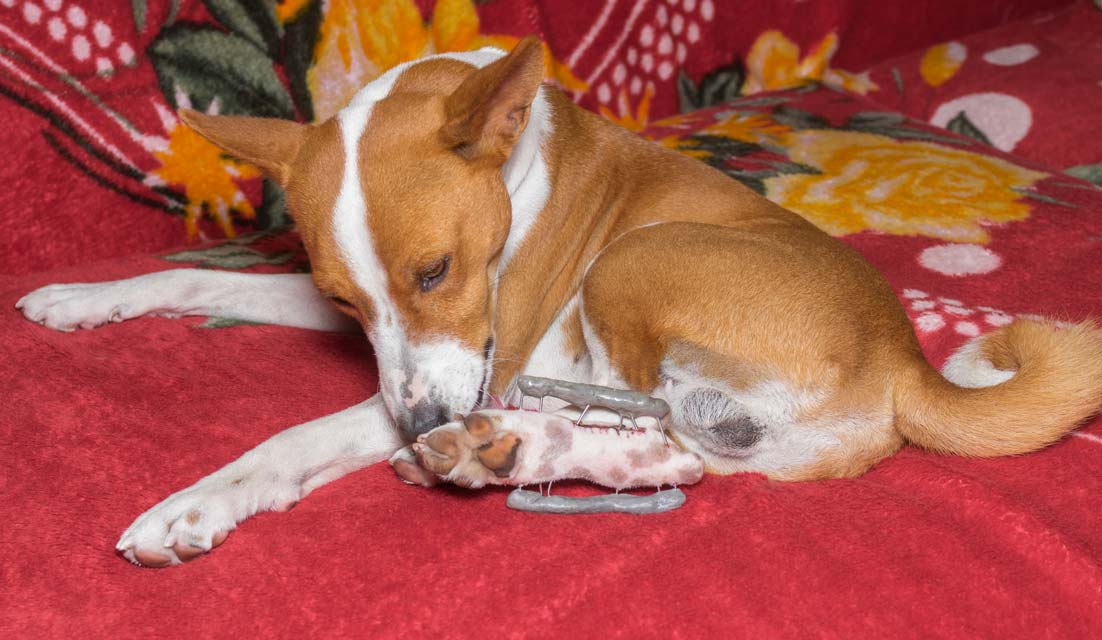Is It Good for Dogs to Lick Their Wounds?

Dogs, along with many other animals, have an instinctive urge to lick at any wounds they receive. Many people believe that's a good thing, saying that dog saliva contains healing compounds. But is that true?
Evidence of Saliva Helping Wounds
In ancient Egypt, people believed that if a dog licked your wound, it would heal better and faster. That belief was transferred to the Greeks, and they even had some temples where wounded people would go to receive healing licks from a trained dog.
Dog saliva does have the ability to help with simple wound healing. First, the act of removing dirt and debris from the wound through licking may help. Additionally, saliva contains proteins that may help fight bacterial infections and promote healing over of the skin. There is even a compound in saliva that can act as a painkiller.
But Saliva Can Also Hurt Wounds
However, there are other compounds in saliva too, including lots and lots of bacteria, especially Pasteurella species. Those bacteria aren't usually a problem when they're inside the mouth, but when they're introduced into a wound, they can rapidly cause an infection.
Not only that, but the physical scraping of the wound by the tongue can disrupt the healing process and slow down or stop healing. At surgical sites, licking can disrupt and tear out sutures, resulting in opening of the incision.
Also, once a dog begins licking at something, we often see a vicious cycle of licking, worsening of the wound, and more licking, until your dog is making a bigger, possibly infected wound. So, while a little licking may be beneficial, it's easy for it to turn into a lot of licking, which is harmful.
Should Dogs Be Allowed to Lick Their Wounds?
If your dog has a minor, superficial scrape, allowing your dog to lick it for a minute is probably fine. However, if your dog won't let up with the licking, problems can start fast.
If your dog has a significant wound or a surgical site, licking should be prohibited. Instead, a wound should be cleaned with warm water and treated by a veterinarian if necessary. A surgical site should be kept dry until it's healed.
How to Keep a Dog from Licking a Wound
If your dog has a wound you want to keep her from licking, there are a few things you can try:
- Cover the injury. Some wounds can be loosely covered with gauze to protect them from a dog's mouth. However, this should be done with a veterinarian's input because some wounds can fester and worsen if covered. Additionally, wound coverings shouldn't be too tight that they cut off the blood supply. Some wounds can be covered with a sock.
- Use an Elizabethan collar. Also called E-collars, these contraptions go around a dog's neck and interfere with the ability for the dog to reach a wound with their mouth. There are alternative collars that inhibit a dog's ability to reach certain body parts without blocking their vision, which some dogs prefer. Those include cervical collars and blow-up collars.
- Put on a T-shirt. Some wounds can be covered by putting a human T-shirt on the dog and typing the bottom.
Remember, if your dog has a wound and is licking it, the best thing to do is seek treatment from a veterinarian, who can assist you in finding the best treatment for the situation.
You May Also Like These Articles:
Culture and Sensitivity Skin Test in Dogs
My Dog Has a Lump: What Do I Do?
Lick Granuloma: Causes, Treatments, and Prevention of Acral Lick Granuloma in Dogs
Disclaimer: This website is not intended to replace professional consultation, diagnosis, or treatment by a licensed veterinarian. If you require any veterinary related advice, contact your veterinarian promptly. Information at DogHealth.com is exclusively of a general reference nature. Do not disregard veterinary advice or delay treatment as a result of accessing information at this site. Just Answer is an external service not affiliated with DogHealth.com.
Notice: Ask-a-Vet is an affiliated service for those who wish to speak with a veterinary professional about their pet's specific condition. Initially, a bot will ask questions to determine the general nature of your concern. Then, you will be transferred to a human. There is a charge for the service if you choose to connect to a veterinarian. Ask-a-Vet is not manned by the staff or owners of DogHealth.com, and the advice given should not delay or replace a visit to your veterinarian.



